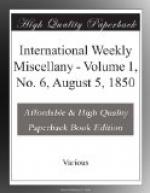Giovanna witnessed the Count’s emotion with sadness. “To have,” she said mournfully, “one’s first, pure, ardent, passionate affection unrequited, scorned, made a jest of, is indeed a bitterness, almost equal to that of death.”
She made a strong effort to conceal her emotion. Indeed she controlled it so well as to speak the rest with a sort of gayety.
“You have at least been candid, Count Roszynski; I will imitate you by telling a little history that occurred in your country. There was a poor girl born and bred a serf to her wealthy lord and master. When scarcely fifteen years old, she was torn from a state of happy rustic freedom—the freedom of humility and content—to be one of the courtly slaves of the Palace. Those who did not laugh at her, scolded her. One kind word was vouchsafed to her, and that came from the lord’s son. She nursed it and treasured it; till, from long concealing and restraining her feelings, she at last found that gratitude had changed into a sincere affection. But what does a man of the world care for the love of a serf? It does not even flatter his vanity. The young nobleman did not understand the source of her tears and her grief, and he made a present of her, as he would have done of some animal, to his betrothed.”
Leon, agitated and somewhat enlightened, would have interrupted her; but Giovanna said, “Allow me to finish my tale. Providence did not abandon this poor orphan, but permitted her to rise to distinction by the talent with which she was endowed by nature. The wretched serf of Pobereze became a celebrated Italian cantatrice. Then her former lord meeting her in society, and seeing her admired and courted by all the world, without knowing who she really was, was afflicted, as if by the dictates of Heaven, with a love for this same girl,—with a guilty love”—
And Giovanna rose, as she said this, to remove herself further from her admirer.
“No, no!” he replied earnestly; “with a pure and holy passion.”
“Impossible!” returned Giovanna. “Are you not married?”
Roszynski vehemently tore a letter from his vest, and handed it to Giovanna. It was sealed with black, for it announced the death of his wife at the baths. It had only arrived that morning.
“You have lost no time,” said the cantatrice, endeavoring to conceal her feelings under an iron mask of reproach.
There was a pause. Each dared not speak. The Count knew—but without actually and practically believing what seemed incredible—that Anielka and Giovanna were the same person—his slave. That terrible relationship checked him. Anielka, too, had played her part to the end of endurance. The long cherished tenderness, the faithful love of her life could not longer be wholly mastered. Hitherto they had spoken in Italian. She now said, in Polish,
“You have a right, my Lord Roszynski, to that poor Anielka who escaped from the service of your wife in Florence; you can force her back to your palace, to its meanest work; but”—




